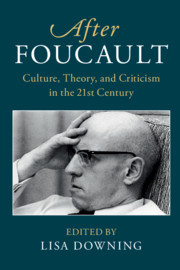Book contents
9 - Foucault and Sex
from Part III - Reading After Foucault
Published online by Cambridge University Press: 30 May 2018
Summary
So much depends on what you mean by the term sex.
Elevating sex from a word (whose meaning we all intuitively know) to a term (whose meaning becomes apparent only within a constellation of philosophically specific concepts) suggests that already we have segued into a different world. In this world sex, far from a natural given, is culturally conditioned and historically produced. Certainly we are not being controversial in observing that the experience of sex, as well as its social organization and meaning, changes over time and across different cultures. The work of Michel Foucault is largely responsible for the fact that today such claims hardly seem daring or new. Yet there are elements of Foucault's thinking about sex and sexuality that remain to be fully appreciated in our current critical landscape. When, for example, he contends that ‘sex … is doubtless but an ideal point made necessary by the deployment of sexuality’, this conception of sex seems far from obvious. For reasons that will become apparent, Foucault's readers have had considerably more to say about his account of sexuality than about his conception of sex.
It is striking how frequently the canonical guides to Foucault skirt the problem of sex. Even Foucauldian scholars who bill their books as being about ‘sex’ often end up writing almost exclusively about gender. Given such elisions, I want to make clear from the outset that by the term sex I refer not to who you are (male, female, trans, intersex), but to what you do (or might do) with your body for the purposes of pleasure. In other words, here sex refers to erotic practice, not to sexual difference, sexual identity, or sexual role. We need this distinction because the word ‘sex’ describes both a status and an activity, with the heteronormative assumption being that one determines the other. It is a fallacy of our time – one that Foucault helps demystify – to assume that what you do sexually should give rise to an identity. The very idea of ‘sexual identity’ is a contradiction in terms, yet we continue to believe in it for an array of historically specific reasons.
- Type
- Chapter
- Information
- After FoucaultCulture, Theory, and Criticism in the 21st Century, pp. 141 - 154Publisher: Cambridge University PressPrint publication year: 2018
- 1
- Cited by

